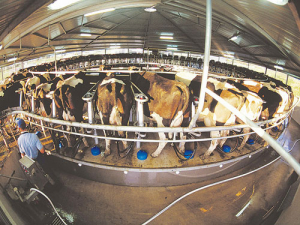The Ministry of Primary Industries says periodic checks of farms’ primary and secondary milk cooling capabilities will be undertaken.
This is to confirm that the cooling equipment in place is adequate to meet the minimum regulatory requirements.
“This is particularly important with controlled milk pumping, to confirm that the cooler and refrigeration unit are sized appropriately,” MPI says.
Twice per season the temperature will be recorded of the milk entering the bulk milk tank (after primary cooling) and the temperature of the milk in the bulk milk tank three hours from the completion of milking.
The temperature and time of either collection or use of the milk will be recorded.
Any failure to cool the milk in accordance with this section will result in the milk being withheld from supply unless it can be shown that:
(i) at no time was the milk more than 10°C above requirement
(ii) the time the milk was above the required temperature was less than four hours
(iii) the milk acidity does not exceed 0.165%
(iv) the milk shows no signs of deterioration by sensory evaluation.
Whether the milk is withdrawn or supplied for further processing, the details will be recorded.
A new milk cooling standard has applied since August 2016, though farm dairies meeting existing requirements are being granted an exemption to June 1 2018.
Since August 1, 2016 raw milk must:
(i) be cooled to 10 degrees C or below within four hours of the start of milking, and
(ii) be cooled to 6 degrees C or below within six hours of the start of milking and within two hours of the completion of milking
(iii) be held at or below 6 degrees C until collection or the next milking
(iv) not exceed 10 degrees C during subsequent milkings. Where there is continuous or extended milking, such as automated milking systems, the milk will be snap chilled so that it enters the bulk milk tank at 6 degrees C or below.
“Continuous or extended milking” is defined as milking for six hours or longer from the start of milking until completion of milking.
“To confirm the capability of milk cooling equipment, records will be kept to show that milk cooling requirements are being met,” MPI says.
Monitor and record
As a minimum, full milk cooling performance will be monitored and recorded on at least three occasions per dairy season, including:
(i) one performance check within the first two months of lactation, once the full herd has calved
(ii) one performance check about the time of peak milk production; and
(iii) one performance check in February each year.
Should the information collected show that milk is not being cooled within the required parameters then action will be taken immediately to correct milk cooling performance.
If milk is not being cooled within the required time/temperature parameters it is recommended that the performance of the milk cooler is assessed and the farm dairy assessor and refrigeration supplier consulted before committing to capital expenditure. Consideration should be given to improving the cooling performance of the existing equipment in place, and to technology options that improve existing equipment performance.
Independent advice can also be obtained from the EECA and through the MPI website.











